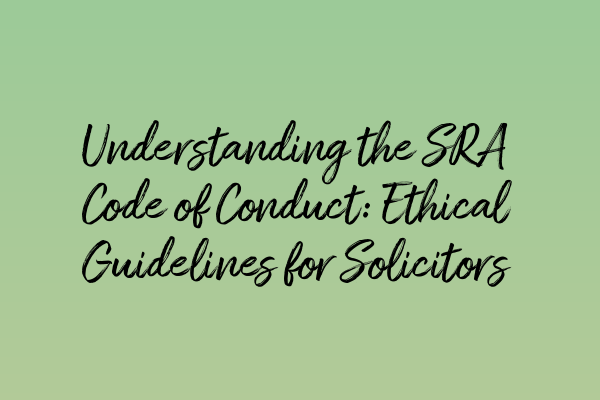Understanding the SRA Code of Conduct: Ethical Guidelines for Solicitors
As a solicitor, it is essential to uphold professional ethics and abide by the regulatory framework set forth by the Solicitors Regulation Authority (SRA). The SRA Code of Conduct serves as a guiding document, outlining the ethical obligations and professional standards that solicitors must adhere to. In this blog post, we will dive deep into the SRA Code of Conduct to help you gain a comprehensive understanding of its guidelines.
The SRA Code of Conduct is divided into two parts. Part 1 contains the fundamental principles that all solicitors must follow. These principles are the foundation of ethical behavior and include:
1. Integrity: Solicitors must act with integrity, complying with the law and promoting public trust and confidence in the legal profession.
2. Independence: Solicitors must act independently and without compromising their professional judgment.
3. Objectivity: Solicitors must act in the best interests of their clients and provide unbiased advice.
4. Standards of service: Solicitors must provide a high standard of service to their clients, including effective communication and timely delivery of work.
5. Confidentiality: Solicitors must maintain client confidentiality and protect sensitive information.
6. Conflict of interest: Solicitors must avoid conflicts of interest and act in the best interests of each client.
7. Duty to the court: Solicitors have a duty to the court and must act with honesty and integrity while representing their clients.
Part 2 of the SRA Code of Conduct provides more detailed guidance on specific ethical considerations. It covers areas such as client care, supervision, confidentiality, conflicts of interest, referrals, and publicity. Each area is crucial for solicitors to understand and comply with to maintain professional conduct.
One notable aspect of the SRA Code of Conduct is the emphasis on diversity and inclusion. Solicitors are expected to promote equality and diversity within their firms and the wider legal profession. By fostering an inclusive environment, solicitors can contribute to a fair and accessible justice system.
The SRA Code of Conduct also recognizes the importance of keeping up with technological advancements. Solicitors are encouraged to embrace technology and incorporate it into their practice to enhance service delivery and efficiency. This not only benefits clients but also helps solicitors stay competitive in the modern legal landscape.
To deepen your knowledge on related topics, consider exploring these articles:
– A Closer Look at the Bar Professional Training Course (BPTC)
– The Role of Technology in Modern Legal Practice
– Financing Your Law Degree: Understanding Costs and Options
– A Look into Prominent Law Firms in the UK
– Staying Ahead: Current Legal Industry Trends in the UK
In conclusion, the SRA Code of Conduct serves as a compass for solicitors, guiding them in maintaining professional ethics and providing the best service to their clients. By understanding and adhering to these ethical guidelines, solicitors can uphold the integrity of the legal profession and build trust within the community. It is crucial for solicitors to stay updated on the SRA Code of Conduct and continuously strive for excellence in their practice.


Leave a Reply